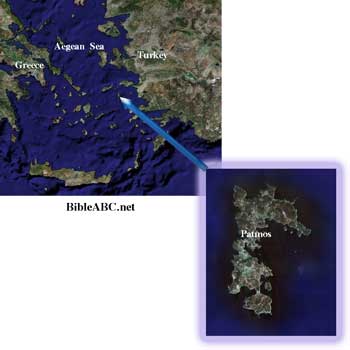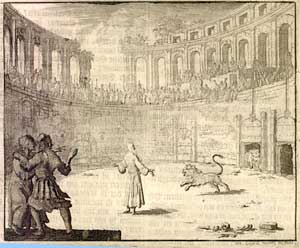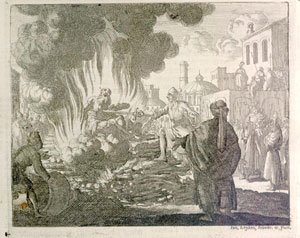Section 2 of Preface: World Events Near the Time of
the Writing of The Revelation:
Following the destruction of Jerusalem and the
Temple, following are some additional historical
accounts during the period from
A.D. 81 to
A.D. 117:
Domitian's Persecution:
Nero's successor
With terrible cruelty, the emperor Domitian
(emperor
A.D. 81-96) put to death without trial
a great number of men at Rome...Finally, he showed
himself Nero's successor in hostility to God. He
was the second to organize a persecution against
us, though his father, Vespasian, had no such
evil plans.(1)
John at the island of Patmos
 Early
church tradition indicates that the apostle John
was banished to the island of Patmos by the
Emperor Domitian. Domitian was the de
facto Emperor between
A.D. 69 and
A.D. 70.
(Domitian's father was the real emperor, but
Domitian acted as emperor until his father
returned to Italy in
A.D. 70 and appointed Nerva
as his chief administrator). Early
church tradition indicates that the apostle John
was banished to the island of Patmos by the
Emperor Domitian. Domitian was the de
facto Emperor between
A.D. 69 and
A.D. 70.
(Domitian's father was the real emperor, but
Domitian acted as emperor until his father
returned to Italy in
A.D. 70 and appointed Nerva
as his chief administrator).
Domitian was again Emporer following the
death of his brother Titus in
A.D. 81.
Domitian died in
A.D. 96 and was succeeded by Nerva. It is unclear as to whether John
received the Revelation in
A.D. 69-70 or later
in ~
A.D. 96.
Writing about the number of the name given
the antichrist in Revelation (666 in Revelation
13:18), Irenaeus says this about John in Book 5
of his "Against Heresies:"
"Had it been necessary to announce his
name (the antichrist) clearly at the present
time, it would have been stated by the one
who saw the revelation (John). For it was
seen not long ago but nearly in our own
time, at the end of Domitian's reign."
Emperor Trajan:
Symeon, and elder in the Lord's church
After Nero and Domitian, under the emperor
Trajan (emperor during
A.D. 98-117), whose times
I am now describing, tradition tells of sporadic
persecution against us in some cities as a
result of some popular riots. Symeon, son of
Clopas, the second bishop (also called 'elder')
in Jerusalem ended his life in martyrdom.(1)
Godless error & the deceit of false prophets
Hegesippus wrote that at this time
(approximately
A.D. 110 ) the church had remained
a virgin, pure and uncorrupted, and any who
might try to defile her lurked in obscure
darkness. But when the sacred band of the
apostles and the generation of those who heard
divine wisdom with their own ears passed on,
then godless error began through the deceit of
false teachers who, now that the apostles were
gone, tried to counter the truth by proclaiming
falsely the knowledge so-called.(1)
They rose at dawn to sing to Christ
In
A.D. 112 -- So great was the persecution
among us in many places that Pliny the Younger,
one of the most distinguished governors, was
alarmed at the number of martyrs, which he
reported to the emperor. In the same letter he
mentioned that they did nothing evil or illegal:
they merely rose at dawn to sing to Christ as if
a god, and they forbade adultery, murder, and
similar crimes and in every way conformed to the
(Roman) law. In response Trajan issued an edict
that Christians were not to be hunted out but
were to be punished if they were identified.(1)
Food for wild animals
 Tradition
has it that Ignatius (named as second after
Peter to succeed as one of the elders or bishops
of Antioch) was sent from Syria to Rome and
became food for wild animals because of his
witness for Christ (approx.
A.D. 110 ). Ignatius
strengthened the Christian community by speech
and encouragement in every city where he stayed.
He warned them in particular to be on guard
against the heresies that were then first
beginning to spring up, urging them to hold fast
to the apostolic tradition...(1) Tradition
has it that Ignatius (named as second after
Peter to succeed as one of the elders or bishops
of Antioch) was sent from Syria to Rome and
became food for wild animals because of his
witness for Christ (approx.
A.D. 110 ). Ignatius
strengthened the Christian community by speech
and encouragement in every city where he stayed.
He warned them in particular to be on guard
against the heresies that were then first
beginning to spring up, urging them to hold fast
to the apostolic tradition...(1)
If only I may attain to Christ Jesus
Ignatius wrote "From Syria to Rome, I am
fighting with wild animals on land and sea night
and day, chained to ten leopards -- a troop of
soldiers -- whose kindness makes even worse.
Their shameful deeds increase my discipleship,
but this does not justify me. May I benefit from
those wild beasts that are ready for me, and I
pray they are prompt. I will coax them to devour
me quickly, not as with some who they have been
afraid to touch. If they are unwilling, I will
force them to do it. Pardon me, but I know what
is best for me: now I am starting to be a
disciple. May I envy nothing seen or unseen in
gaining Jesus Christ. Let fire and cross,
struggles with beasts, tearing bones apart,
mangling of limbs, crushing of my whole body,
and tortures of the Devil come upon me, if only
I may attain to Jesus Christ.(2)
How can I blaspheme my King who saved me?
Polycarp (an elder or bishop of the church in
Smyrna) wrote about Ignatius and other martyrs
in his letter to the Philippians: "I urge all of
you to practice the obedience and endurance you
saw not only in the blessed Ignatius, Rufus, and
Zosimus, but also in others among you and in
Paul himself and the other apostles, who did not
run in vain but in faith and righteousness, who
are in the place they deserve at the side of the
Lord whose suffering they have shared..."(3)
 Note:
Polycarp was martyred sometime between
A.D. 156
and 168. Polycarp in the stadium in Rome refused
to deny Jesus saying: Note:
Polycarp was martyred sometime between
A.D. 156
and 168. Polycarp in the stadium in Rome refused
to deny Jesus saying:
"For eighty-six years I have been his
servant, and he has never done me
wrong...How can I blaspheme my King who
saved me?...Listen now I am a
Christian....and if you wish to learn about
the teachings of Christianity, choose a day
and you will hear them."
Polycarp was burned at the stake at the
stadium.
(1) Source: Eusebius - The Church
History (Eusebius of Caesarea -
A.D.260-339 - was the
first to undertake the task of tracing the rise of
Christianity during its crucial first three
centuries from Christ to Constantine.)
(2) Source: Ignatius Romans 5.
(3) Source: Polycarp Philippians 10.13
Question:
According to the following historical accounts,
in the time of Domitian and Trajan (emperors of Rome
from
A.D. 81 to
A.D. 117), what happened with
respect to the followers of Jesus? |